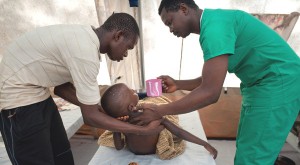Source: Adam Nossiter, New York Times – Aug 22, 2012
Cholera Epidemic Envelops Coastal Slums in West Africa
DAKAR, Senegal — A fierce cholera epidemic is spreading through the coastal slums of West Africa, killing hundreds and sickening many more in one of the worst regional outbreaks in years, health experts said.
Cholera, transmitted through contact with contaminated feces, was made worse this year by an exceptionally rainy season that flooded the sprawling shantytowns in Freetown and Conakry, the capitals of Sierra Leone and neighboring Guinea.

A health care worker treated Santigie Bundu's dehydrated 7-year-old son, on Aug. 13, at a cholera treatment center in Freetown, Sierra Leone.
In both countries, some two-thirds of the population lack toilets and defecate in the open, a potentially lethal threat in the rainy season because of the contamination of the water supply. Doctors Without Borders said there have been nearly twice as many cholera cases so far this year as there were in the same period in 2007 in Sierra Leone and Guinea.
Already, about 13,000 people suffering from the disease’s often fatal symptoms — diarrhea, vomiting and severe dehydration — have been treated in those two countries, and between 250 and 300 have died, Doctors Without Borders said.
In Sierra Leone, the government last week declared the cholera outbreak a national emergency, while aid workers in Guinea said the peak of the outbreak had not likely been reached. Both countries have been wracked by years of civil and political unrest, with Sierra Leone still recovering from a decade of bloody civil war that drove thousands from rural areas into the city’s slums and Guinea emerging from a half-century of often brutal dictatorship.
Rains have already contributed to cholera deaths in the landlocked nations of Mali and Niger as well, health officials said.
Aid workers said the number of cases of the highly contagious disease continued to increase, particularly in Freetown, where most live in slums and children swim in polluted waters. Often, patients arriving at treatment centers arrive in poor condition — near death, in some cases.
“They come barely conscious because they are severely dehydrated,” said Natasha Reyes Ticzon, a cholera field coordinator for Doctors Without Borders in Freetown. “We’ve had some deaths because they come too late. What’s alarming is they get very ill, and very ill fast. The numbers are still rising, and the rainy season has not ended yet.”
There have been more than 11,600 cholera cases in Sierra Leone since January, at least 216 of them fatal, according to the country’s health minister, Zainab Bangura. In Guinea there have been 80 deaths out of 2,700 cases so far. More than 1,000 new cases a week are being recorded in Freetown, health officials said.
“There has been heavy rain throughout the past month, and this is not helping,” said Daniel Mouqué of Doctors Without Borders in Conakry. The peak of the cholera outbreak comes right after the rain stops. There is a realistic possibility that we haven’t reached the peak yet. Our numbers are way higher than in 2007.”
The houses of cholera patients are being sprayed with chlorine to stem the spread of the disease, Mr. Mouqué said.
In the 14 countries of West and Central Africa there have been 40,799 cholera cases this year, and 846 deaths, with over half the reported cases originating in the Democratic Republic of Congo.
Unicef said those figures are comparable to the regional totals for 2011, when there were more than 105,000 cases and nearly 3,000 deaths in what was considered to be one of the region’s worst cholera epidemics.
Whereas last year’s epidemic was focused on the Lake Chad area of Cameroon, Nigeria, Chad and Niger, this year it is concentrated on the coast.
As in Freetown, sanitary conditions in Conakry are poor. “Garbage collection is highly irregular. There are piles of garbage everywhere,” said Dr. Sakoba Keita, the Guinean government official in charge of fighting against diseases. “Lots of neighborhoods have no potable water.”
On top of that, he said, contaminated rainwater has infiltrated neighborhood wells, leading the authorities to attempt to disinfect water supplies with chlorine.
In Freetown, officials pointed to the poor disposal of feces as a particular threat. “Because of the lack of toilet facilities, they sometimes defecate in plastic bags, and throw them indiscriminately around,” said Patrick Trye, a Freetown native who works for Doctors Without Borders.
For now, officials are working to contain the epidemic, even while acknowledging that a long-term resolution remains elusive in this impoverished region.
“If your area is flooded with rainwater, and if people are defecating in the open, it will get into the water supply,” said Jane Bevan, a regional sanitation specialist for Unicef. “We know governments have the money for other things. I’m afraid sanitation is never given the priority it deserves.”





